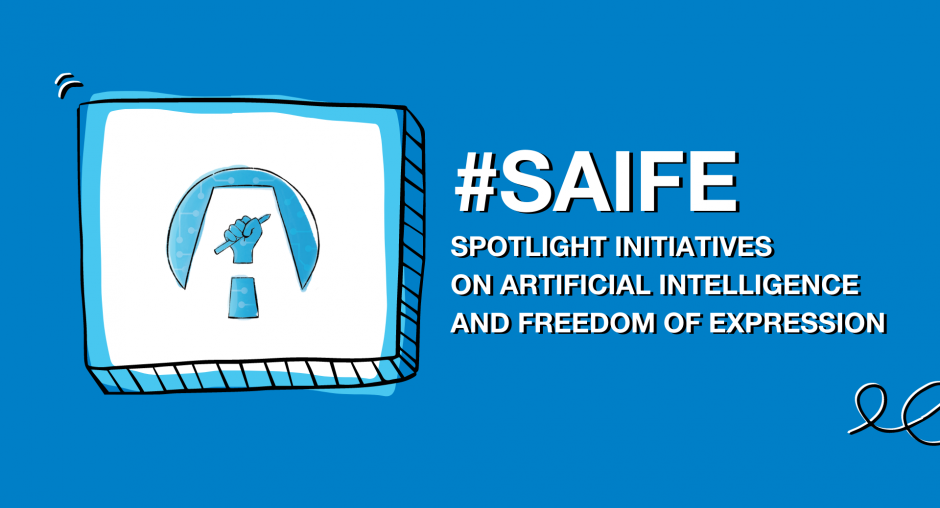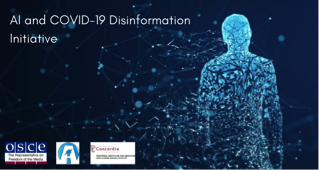#SAIFE Resource Hub
In autumn 2020, the Office of the OSCE Representative on Freedom of the Media (RFoM) published a call for proposal for innovative ideas and initiatives to tackle the challenges brought on by Artificial Intelligence. This resulted in a variety of local and international activities to safeguard freedom of expression in an AI-powered online environment.
The RFoM decided to support nine of these initiatives, all of which identify ways in which AI affects freedom of expression and provide guidance on who can – and should – do what to better protect freedom of speech in a digital context. Thereby, the initiatives directly contribute to the RFoM’s #SAIFE project and its aim to find the most effective ways to safeguard freedom of expression and media pluralism, when deploying AI.
Decoding Hate Podcast
"Decoding Hate" is a podcast series, which explores the interplay between freedom of expression, AI, and hate speech online. In the six-part series renowned experts offer their insights into what freedom of expression means and requires in this new 'digital age'. They also discuss the challenges of combating hate speech for public and private regulators, the complexities of content moderation by human and AI moderators, and the pathways forward. The experts include Nani Jansen Reventlow; Professor Tarlach McGonagle; Jillian York; Thiago Dias Oliva; Professor Sahana Udupa; Professor Molly Land; Rikke Frank Jørgensen.
www.decodinghatepod.com
Better Human Podcast
Freedom of expression in the digital age is often reduced to the rights of the speaker. But this fundamental freedom is much more complex than that. This podcast aimed to explore the often ignored aspects of freedom of expression in the context of AI: freedom of opinion and freedom of information. It focuses on the freedoms and rights of the receiver and the ways in which AI affects what we see and how we share. To look at these questions from a variety of angles, Susie Alegre, international human rights lawyer, created a mini-series of six episodes within the wider platform of the Better Human Podcast – a popular podcast hosted by Barrister Adam Wagner that makes human rights issues accessible to the general public. This series discussed a range of issues with experts in their fields including:
www.betterhumanpodcast.com
- Social Media Disinformation with Meetali Jain, Legal Director of Avaaz
- Political Propaganda with Dr. Emma L Briant, Maven of Persuasion
- Recommender Algorithms with Prof Lorna Woods, University of Essex
- Personalisation with Dr Elif Mendos Kuskonmaz, University of Portsmouth
- The impact of AI on writers with Brendan de Caires, Director of PEN Canada
- Freedom of Opinion with Prof Evelyn Aswad, University of Ohio
Policy Paper "AI and freedom of expression in political competition and elections" and “Guidelines for API Access to Social Media”
The Policy Paper “AI and freedom of expression in political competition and elections” captures the current impact of AI on freedom of expression in political campaigning, and recommends a human rights-based approach to policies and regulatory measures in support of upholding the right to freedom of expression, the right to political participation as well as an effective civil society access to data for an independent social media monitoring. The Policy Paper also addresses the regulatory and soft-law approach to the challenges posed by AI.At the same time, civil society watchdogs need to be empowered to collect and analyze the data necessary for carrying out their missions, to monitor the social impact of social media platforms, and hold platforms and politicians accountable. The “Guidelines for API Access to Social Media” aims to show how to obtain access to public data from internet intermediaries, in particular the two social media platforms Twitter and Facebook.The two documents were jointly prepared by VDSG / data4good and Election-Watch.EU, who also co-organised a webinar on this topic on 27 January 2021 which can be viewed on the VDSG YouTube Channel.
Interview series on AI and COVID-19 Disinformation
The “AI and COVID-19 Disinformation Initiative” explores the impact of AI in enabling and confronting COVID-19 related disinformation, as well as the intersection of AI in relation to digital threats that are taking advantage of the pandemic “infocalypse” that is eroding social cohesion and trust in democratic values, institutions and the media. A series of interviews with renowned experts from different backgrounds explores policies on how AI can be harnessed and regulated to better counter online disinformation and guarantee freedom of expression, including in times of crises.
- Interview with Lucina Di Meco of ShePersisted.org
- Interview with Isadora Hellegren of the Swedish International Development Cooperation Agency
Interview with Owen Bennett of the Mozilla Corporation
- Interview with Emma Llansó of the Center for Democracy & Technology
- Interview with Naďa Kovalčíková of the German Marshall Fund of the United States
- Interviews with William Marcellino of the RAND Corporation
- Interview with Linda Slapakova of RAND Europe
- Interview with Alice Stollmeyer of Defend Democracy
- Interview with Fabio Chiusi of AlgorithmWatch
- Interview with Zach Devereaux of Nexalogy
- Interview with Ather Gattami of RISE Sweden
- Interview with John Villasenor of UCLA and the Brookings Institute
- Interview with Marcus Kolga of DisinfoWatch




